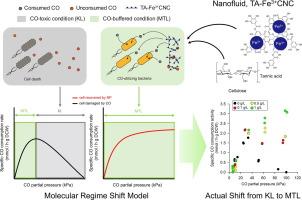Molecular regime shift from kinetic limitation condition to mass-transfer limitation condition for stabilizing CO metabolism by microorganisms
IF 13.3
1区 工程技术
Q1 ENGINEERING, CHEMICAL
引用次数: 0
Abstract
Carbon monoxide (CO) serves as a promising carbon source, but it adversely affects CO-metabolizing microorganisms. To address this issue, fermentation should occur under mass-transfer limitation conditions, where the rate of gaseous CO transfer is lower than its consumption rate. However, maintaining these conditions becomes challenging as microorganism physiology deteriorates during fermentation, requiring a novel strategy to sustain mass-transfer limitation conditions. In this study, cellulose-based nanocrystals coated with a tannic acid-Fe3+ complex (TA-Fe3+CNC) were developed. These nanocrystals exhibited reversible CO adsorption/desorption characteristics, enabling the transformation from kinetic to mass-transfer limitation conditions. This approach effectively mitigated substrate inhibition from CO with negligibly impacting cell physiology. Kinetic studies demonstrated the effectiveness of TA-Fe3+CNCs in mitigating CO inhibition under high CO partial pressures. Furthermore, computational modeling validated the successful shifting from kinetic to mass-transfer limitation conditions at the molecular level. Overall, this study introduces a novel platform for stabilizing CO metabolism by microorganisms

求助全文
约1分钟内获得全文
求助全文
来源期刊

Chemical Engineering Journal
工程技术-工程:化工
CiteScore
21.70
自引率
9.30%
发文量
6781
审稿时长
2.4 months
期刊介绍:
The Chemical Engineering Journal is an international research journal that invites contributions of original and novel fundamental research. It aims to provide an international platform for presenting original fundamental research, interpretative reviews, and discussions on new developments in chemical engineering. The journal welcomes papers that describe novel theory and its practical application, as well as those that demonstrate the transfer of techniques from other disciplines. It also welcomes reports on carefully conducted experimental work that is soundly interpreted. The main focus of the journal is on original and rigorous research results that have broad significance. The Catalysis section within the Chemical Engineering Journal focuses specifically on Experimental and Theoretical studies in the fields of heterogeneous catalysis, molecular catalysis, and biocatalysis. These studies have industrial impact on various sectors such as chemicals, energy, materials, foods, healthcare, and environmental protection.
 求助内容:
求助内容: 应助结果提醒方式:
应助结果提醒方式:


